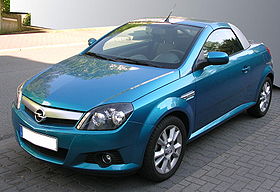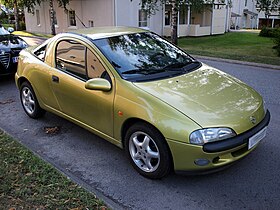Opel Tigra
| Opel Tigra | |
|---|---|
 | |
| Overview | |
| Manufacturer | Opel (General Motors) |
| Production | 1994–2000 2004–2009 |
| Body and chassis | |
| Class | Sport compact |
| Layout | Front-engine, front-wheel-drive |
The Opel Tigra name has been applied to two different cars engineered and produced by the German automaker Opel, both based on different iterations of the Corsa supermini, the first built in Spain, the second in France. The first Tigra was a small 2+2 coupé, produced from 1994 to 2000. The later compact hard-topped convertible roadster model was introduced in 2004. The Tigra was sold in the United Kingdom as the Vauxhall Tigra, in Australia as the Holden Tigra, and was sold in Brazil, Argentina and Mexico as the Chevrolet Tigra.
Tigra A (1994–2000)
| Tigra A | |
|---|---|
 | |
| Overview | |
| Also called | Chevrolet Tigra Vauxhall Tigra Opel/Vauxhall Tigra GTi Spyder |
| Production | 1994–2000 |
| Assembly | Zaragoza, Spain |
| Body and chassis | |
| Body style | 2-door coupé |
| Platform | GM4200 |
| Related | Opel Corsa B |
| Powertrain | |
| Engine | |
| Transmission | 4-speed automatic 5-speed Manual Transmission |
| Dimensions | |
| Wheelbase | 2,429 mm (95.6 in) |
| Length | 3,922 mm (154.4 in) |
| Width | 1,604 mm (63.1 in) |
| Height | 1,340 mm (52.8 in) |
| Curb weight | 980 kg (2,161 lb)-1,075 kg (2,370 lb) |


The first Tigra was based on the coupé concept car of the same name that was shown at the 1993 Frankfurt Motor Show, alongside an open-top Tigra Roadster concept and the Scamp off-roader/pick-up. The Tigra built on the platform of the second generation Opel Corsa. The production vehicle was introduced in early 1994, and was built at Opel's Zaragoza plant in Spain.
The Tigra shared no body panels with the Corsa on which it was based, and the interior layout was different, however still kept the Corsa dashboard and most major engine parts. The Tigra also included a 2+2 seating arrangement. Due to the coupe styling and compact dimensions of the car, rear seat space was limited.[1]
The Tigra was available with two petrol engines options, both from the Ecotec family, an entry level 1.4 L with 90 PS (66 kW), and a larger sportier version, powered by the 1.6 L engine with 106 PS (78 kW), sourced from the Corsa GSi and later Corsa Sports. Both were DOHC 16 valve engines with electronic fuel injection. The smaller engine was available with an optional 4-speed automatic gearbox. The 1.6L model came with front fog lights as standard, a feature unavailable on the 1.4L version.
The suspension was essentially unchanged from the Corsa donor model, although the setup had been tweaked by Lotus. However, the car carried extra weight, with 150 kg (331 lb) over the equivalent engined Corsa models. Acceleration on the 1.6 L model was 10.5 seconds, one second slower than the Corsa GSi. A higher top speed of 203 km/h (126 mph) was obtained thanks to the higher gear ratios, a lower drag coefficient of 0.31, and standard 15" wheels on the more powerful model.
The car was imported by GM and sold as the Chevrolet Tigra in Brazil and Mexico, and as the Vauxhall Tigra in the United Kingdom. The Brazilian Chevrolet Tigra was imported only for a few months, between late 1998 to early 1999, due to a sudden depreciation of the real, which forced General Motors do Brasil to end importation. Only the 1.6 L model was imported, detuned to 100 PS (74 kW; 99 hp) for tax purposes. The 15" wheels were also exchanged for more affordable 14" wheels.
The television advertisements for the Tigra used the single from The Pogues's If I Should Fall from Grace with God, "Fiesta".
Tigra TwinTop B (2004–2009)
| Tigra TwinTop B | |
|---|---|
 | |
| Overview | |
| Also called | Vauxhall Tigra TwinTop Holden Tigra |
| Production | 2004–2009 |
| Assembly | Cerizay, France[2] |
| Body and chassis | |
| Body style | 2-door convertible |
| Platform | GM4300 |
| Related | Opel Combo C Opel Meriva A Opel Corsa C |
| Powertrain | |
| Engine | |
| Transmission | 5-speed manual 5-speed semi-automatic |
| Dimensions | |
| Wheelbase | 2,491 mm (98.1 in) |
| Length | 3,921 mm (154.4 in) |
| Width | 1,685 mm (66.3 in) |
| Height | 1,364 mm (53.7 in) |
| Curb weight | 1,235 kg (2,723 lb)-1,278 kg (2,818 lb) |

After an absence of four years, Opel resurrected the Tigra nameplate in 2004, for a new sports car based on the third generation Opel Corsa.[3] The Tigra TwinTop, as it was called in Opel markets, was a two-seater coupé convertible with a retractable hardtop in the fashion of the Peugeot 206 CC. It was launched at the Geneva Motor Show in March 2004 and was produced by French coachbuilder Heuliez.[4]
Like its predecessor, the Tigra TwinTop was available with two petrol-powered engines. The base model used the 1.4 L engine with 90 PS (66 kW), from the Family 0, while the top of the range uses the Ecotec 1.8 L from the Corsa GSi, with 125 PS (92 kW). An economic version, which used Fiat's Multijet 1.3 Diesel engine, was introduced in 2005.
The second generation was marketed in Australia as the XC-series Holden Tigra, only with the 1.8 L engine.
Safety
| Test | Score | Rating |
|---|---|---|
| Adult occupant: | 26 | |
| Pedestrian: | 10 |
In society and culture
The murderers of Lee Rigby used a Vauxhall Tigra, accelerating the vehicle into him at the start of the attack.[6]
References
- ^ "Last stand: Before [the Ford] Puma there was Tigra...". Car Magazine. February 2001. p. 210.
- ^ "Opel. Opel In France". Car-cat.com. Retrieved 2010-07-19.
- ^ http://archives.media.gm.com/intl/opel/en/news/pr_old/pressrelease_1752.htm
- ^ http://archives.media.gm.com/intl/opel/en/news/pr_old/pressrelease_1795.htm
- ^ "2004 Euro NCAP". Retrieved 2011-10-23.
- ^ Lee Rigby murder timeline, by prosecution - Telegraph
External links
- The European TwinTop communities startpage
- Opel Tigra Twin Top B, All About Cars, 2016
